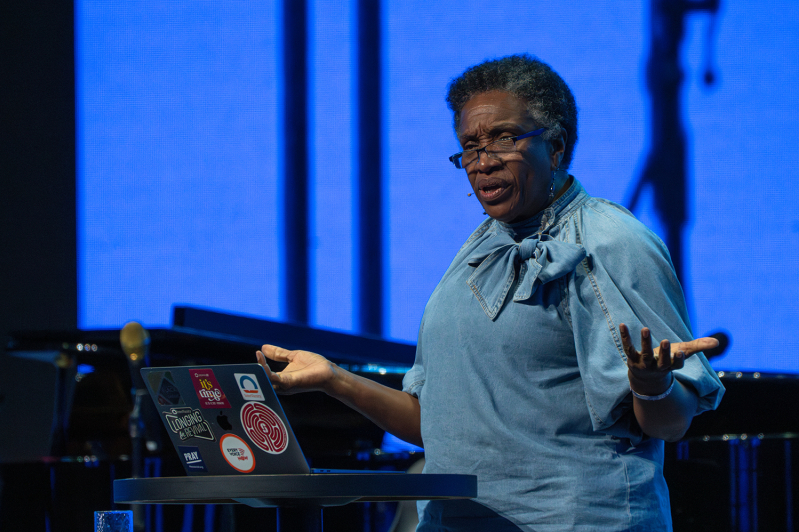
During the morning of Tuesday, September 24 at the Fourth Lausanne Congress on World Evangelization in Incheon, Korea, Denise-Margaret Thompson spoke about the unique challenges and opportunities that this Generation Z brings. The Trinidad and Tobago native highlighted their immersion in the digital world, their concern for social justice and climate change, their hunger for authenticity and community, and their resistance to organized religion.
Thompson's academic ministry is multifaceted as she seeks to transform academia by witnessing in communities of disciples through her roles at InterVarsity USA and the Caribbean Fellowship of Evangelical Students.
Thompson expressed her concerns about how local churches should engage with Gen Z, the generation of those who are born between 1997 and 2012. “We will need to consider collaborating to engage, equip and support these young people, including ordaining and commissioning them to reach their generation thanks to increased lifespans. We have seven distinct generations alive today. And given the historical events influencing each, they talk, think, and communicate in distinctly different ways,” she said.
A particular datapoint that she emphasized was that “these 12- to 27-year-olds past millennials in 2019 is the single largest generation. Roughly 32% of the global population, 60% of Africa is under the age of 25, of the almost 2 billion Gen Zs worldwide, one quarter live in South Asia. India's Gen Z population alone is nearly three times the number across Europe. And there are more Gen Zs in India than there are people in the US. And if we don't figure out how to reach them, we will never achieve the Great Commission.”
The concern how to reach the new generation with the message of salvation is a central issue of this congress. The visualization of “the unreached”, plus the world's demographic growth, are pressing the need to take the message of Christ to the ends of the earth.
“They are the first fully global and digital youth generation, molded in the 21st century, connected by digital devices. Ninety-five percent of Gen Z have a smartphone and 83 percent own a laptop. They are shaped by social media, the internet, the omniverse, terrorism, war and gun violence. They are the first generation trained from elementary school onwards to deal with mass shootings in the US and UK, as well as kidnappings and crime in Nigeria and Kenya. Pandemic and mental health challenges have devastated them. Does the Church know that, worldwide, between 2020 and 2023, reported youth suicide rates tripled during that time? Yes, both inside and outside our churches,” she lamented.
As Thompson explained, “Tech savvy Gen Z's prefer collaborative workspaces, demand healthy balance and value, mentorship, authenticity and transparency from supervisors. Their spiritual awareness is quite high. In one study, 77% self-reported as spiritual ones, some as young as 11 years. They embrace practices including tarot cards, astrology mediation, spiritual healing. Gen Zs, however, reject organized religion, including those raised in the Christian faith with more than half identifying as atheists. They sense there's more going on than they can see with their eyes and are interested not only in whether Christianity is true, they want to see it as good.”
“They are hungry for what Jesus offers: belonging, leadership, peace, authentic and transparent relationships, and community,” she said and continued,“according to McKinsey reports, Gen Z in primary, secondary and tertiary academic institutions are more homogenous in their motivations and concerns than you might think. As the global marketplace grows, technology brings them together. Recent youth consultations and local dialogue efforts revisited the United Nations 2030 agenda for sustainable development. Although the 2021 data comes from the Latin America and Caribbean region, the concerns show remarkable consistency around the world... Is the Church taking note? Gen Zs walk through our university doors more in a single day than they walk through our church doors in an entire year.”
However, Thompson noted that “among their concerns are racial inequity, corruption, climate change, extreme poverty and justice. They also identify human trafficking, mental health, and sexual abuse concerns. All is not lost. The Holy Spirit is at work across the 180 national movements of IFES as he is in our 220 Lausanne countries celebrating years of high school and tertiary academic ministry around the world.”
She referred to some examples of transformation that members of Generation Z are experiencing. She specifically focused on three: “at this small, historically black college in Alabama, Tuskegee University, over the past year, over a hundred students meet weekly for prayer and worship, leading their peers to Christ, The Jackson State and Mississippi students have also been leading their peers to Christ with permission given for baptisms in the fountain at the center of campus at Harvard University, students meet weekly for the public reading of scripture across several of those university departments.”
The second example she gave was that “in the Caribbean, in Trinidad and Tobago, evangelistic bus tours have been organized with music, drama, counseling and prayer. University students and alumni visit high schools all over the island, and hundreds make decisions for Christ on each visit. Students reaching other students with the gospel, visible signs of miracles, deliverances and an observable reduction in subsequent truancy.”
And the third hopeful example was what happened in Martinique: “Gen Z, disenchanted with traditional evangelical and Pentecostal full-gospel structures, have been gathering on their own, with dozens of people coming to faith and doing regular baptisms of other young people professing their faith in Christ.”
“And we the Church. How will we make space and develop systems to engage and equip these student leaders who will embody Christ's culture and values to study, pray, and make disciples?” she asked.
“The church culture I grew up in requires first believing and then being discipled. They must belong before they believe, as Jesus did with his disciples. He invited them to be in community with Him before asking them, 'Who do you say that I am?' Some Scripture passages for our Gen Zs: 'Study to present yourself approved unto God, a workman that needeth not to be ashamed, rightly dividing the word of truth' (2 Timothy 2:15). They are in school, and as a teacher, I demand excellence. We also need to teach them to pray: 'Be anxious for nothing, but in everything by prayer and supplication with thanksgiving let your requests be made known unto God. And the peace of God, which surpasses all understanding, will guard their hearts and minds in Christ Jesus' (Philippians 4:6-7). Next, we are to commission them to make disciples of all nations, sending them out as they move through the educational system and into the job market. The Holy Spirit will teach them to observe all things, and He will be with them always, even to the end of the age (Matthew 28:19-20).”
“Let us pray boldly as we approach His throne of grace with confidence (Hebrews 4:16). We, the followers of Jesus, are concerned about engaging, equipping, motivating and mobilizing Gen Z toward the fulfillment of the Great Commission across all generations. That is why we are here in Seoul this week. God has not changed His mind. He will bring His revival as His people pray, rooted in a sense of His deep love, guided by the Holy Spirit,” noted Thompson.
“As the first fully global generation, these Gen Z's will follow Jesus. Black and brown Gen Z populations around the world: will we welcome and disciple them on their own terms?” she challenged participants.
First published by Diario Cristiano, Christian Daily International's Spanish edition.





